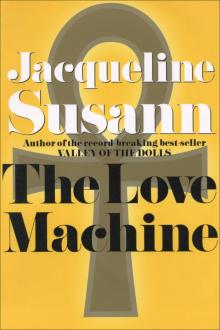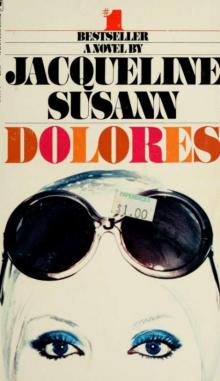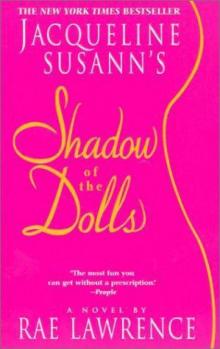- Home
- Jacqueline Susann
Valley of the Dolls Page 2
Valley of the Dolls Read online
Page 2
He paused a second but she did not react, so he hurried on. “Say I was having dinner at ‘21’ with a prospective client. If I go for the right dinner and make with the right words, it’s a pretty good bet he’ll sign with me. But I may have to have six or seven drinks with him and listen to his gripes about his present management. Naturally I’ll swear on my life not to do any of these things. I’ll promise him everything—the moon with his name on it. Now I can’t give him all the things I promise. No one could. But I will want to make an honest effort to avoid the mistakes of his present management and keep what promises I can. Only the next morning I won’t remember a goddam word. That’s where you come in. You won’t have a hangover, because during this thrilling evening you will have sipped one sherry and you will remember everything I have said. The following day you will present me with a list of all the promises and I can study them when my head is clear.”
She smiled. “I’d be sort of a human Dictaphone?”
“Exactly. Think you could handle it?”
“Well, I have an excellent memory and I hate sherry.”
This time they laughed together.
“Okay, Anne. Want to start tomorrow?”
She nodded. “Will I also work for Mr. Bellows?”
He gazed into space and said quietly, “There is no Mr. Bellows. Oh, there’s George, his nephew, but George is not the Bellows in Bellamy and Bellows. That was George’s uncle, Jim Bellows. I bought Jim out before he went to war. I tried to talk him out of it, but no, he went to Washington and got carried away with that Navy uniform and a commission.” He sighed. “War is for the young. Jim Bellows was fifty-three. Too old for war . . . but too young to die.”
“Was he killed in Europe or the Pacific?”
“He died of a heart attack in a submarine, the damn fool!” But the gruffness in his voice only punctuated the affection he felt for the dead man. Then, with an abrupt change of mood, he flashed one of his warm smiles. “Okay, Anne, I guess we’ve exchanged enough of our life stories. I can start you at seventy-five a week—how does that set with you?”
It was more than she had expected. Her room cost eighteen, food about fifteen. She told him she could manage quite well.
October, 1945
September had been a good month. She had found a job she liked, a girl friend named Neely and a gentle, eager escort named Allen Cooper.
October brought Lyon Burke.
She had been welcomed with instant acceptance by the receptionist and two secretaries. She lunched with them each day at the corner drugstore. Lyon Burke was their favorite topic, and Miss Steinberg, the senior secretary, was the expert. She had been with Henry Bellamy ten years. She had known Lyon Burke.
Lyon had been with the office two years when war was declared, and had left to enlist the day after Pearl Harbor. Jim Bellows had often suggested that his nephew join the firm. Henry had nothing against George Bellows, but he had always refused. “Business and relatives don’t mix,” he had insisted. But with Lyon gone, Henry was left with little choice.
There was nothing wrong with George. He was a capable lawyer, but he lacked the chemistry of Lyon Burke—at least in Miss Steinberg’s eyes. Lyon’s activities in the war had been avidly followed by all of the staff, and when he had received his captain’s bars, Henry had taken off half the day to celebrate. The last letter had come from London in August. Lyon was alive, Lyon sent regards—but Lyon said nothing about returning.
At first Henry had watched the mail each day. When September passed without word he moodily reconciled himself to Lyon’s permanent withdrawal from the firm. But Miss Steinberg refused to give up. And Miss Steinberg was right. The wire came in October.
It was direct and to the point:
DEAR HENRY: WELL IT’S OVER AND I’M STILL IN ONE PIECE. VISITED SOME RELATIVES IN LONDON AND STOPPED OFF AT BRIGHTON FOR SOME SEA AND REST. AM IN WASHINGTON WAITING FOR MY OFFICIAL RELEASE. AS SOON AS THEY LET ME TRADE THEIR UNIFORM FOR MY OLD BLUE SUIT I SHALL RETURN. BEST. LYON.
Henry Bellamy’s face lit up when he read the wire. He jumped from his chair. “Lyon’s coming back! Goddam, I knew he would!”
For the next ten days the office was in a turmoil of interior decorators, excitement and speculative gossip.
“I can’t wait.” The receptionist sighed. “He sounds just like my type.”
Miss Steinberg’s smile was loaded with secret knowledge. “He’s everybody’s type, honey. If his looks don’t polish you off, the English accent does the rest.”
“He’s English?” Anne was surprised.
“Born here,” Miss Steinberg explained. “His mother was Nell Lyon. That was way before your time. Mine too. But she was a big English musical comedy star. She came here in a show and married an American lawyer, Tom Burke. She retired and Lyon was born here, so that makes him an American citizen. But his mother held on to her British citizenship, and when Lyon’s father died—I think Lyon was about five—she took him back to London. She went back on the stage and he went to school there. When she died he came back and went to law school here.”
“I know I’ll fall madly in love with him,” the younger secretary said.
Miss Steinberg shrugged. “Every girl in the office had a crush on him. But I can’t wait to see his reaction when he meets you, Anne.”
“Me?” Anne looked startled.
“Yes, you. You both have the same quality. A standoffishness. Only Lyon keeps blinding you with that smile and it fools you at first. You think he’s friendly. But you can never get really close to him. No one could. Not even Mr. Bellamy. Deep down Mr. B.’s a little in awe of Lyon, and not just because of his looks or manner. Lyon delivers. You watch, Lyon Burke will own this town one day. I’ve seen Mr. B. pull some pretty brilliant deals, but he has to fight every inch of the way because everyone knows he’s smart and they’re prepared for him. Lyon just walks in with the English charm and the movie-star looks, and wham! he comes off with everything he wants. But after a while you realize you don’t know what he’s really like—and what he thinks of you, or of anyone. What I mean is, he seems to like everyone equally. So you get the feeling that maybe deep down he doesn’t really care about anyone or anything—except his work. For that, he’ll do anything. But whatever you think about him, you still wind up adoring him.”
The second wire arrived ten days later, on a Friday morning:
DEAR HENRY: HAVE BLUE SUIT. ARRIVE IN NEW YORK TOMORROW NIGHT. WILL COME DIRECTLY TO YOUR FLAT. SEE IF YOU CAN BOOK HOTEL RESERVATION. EXPECT TO START MONDAY. BEST. LYON.
Henry Bellamy took off at noon to celebrate. Anne was just finishing the mail when George Bellows stopped at her desk.
“Why don’t we go somewhere and celebrate, too?” he asked casually.
She couldn’t hide her astonishment. Her association with George Bellows had been confined to an official “good morning” and an occasional nod.
“I’m asking you to lunch,” he explained.
“I’m very sorry, but I promised to join the girls at the drugstore.”
He helped her into her coat. “Too bad,” he said. “This may be our last day on earth.” He smiled ruefully and drifted back to his office.
At lunch she listened to the endless chatter about Lyon Burke with half a mind, wondering idly why she had turned down George’s invitation. Fear of complications? From one lunch? How silly. Loyalty to Allen Cooper? Well . . . Allen was the only man she knew in New York, and he was very kind. Perhaps that did rate him a kind of loyalty.
She recalled the day he had burst into the office, determined to clinch some kind of deal—insurance, Anne later found out. Henry had been unusually cold and had gotten rid of him quickly. So quickly, in fact, that Anne’s sympathies were aroused. As she led him out she had whispered, “Better luck next stop.” He had seemed almost startled at the warmth in her voice.
Two hours later her phone rang. “This is Allen Cooper. You remember me—the dynamic salesman? Well, I want you to know that my sess
ion with Henry was a wild success compared to my other stops. At least at Bellamy’s I met you.”
“You mean you haven’t made a sale?” She felt genuinely sorry.
“Nope. Struck out everywhere. Guess this just isn’t my day . . . unless you want to give it a happy ending by having a drink with me.”
“I don’t . . .”
“Drink? Me either. So let’s make it dinner then.”
That’s how it began—and continued. He was pleasant and had a nice sense of humor. She thought of him as a friend rather than a date. Very often she didn’t bother to change her clothes after work. He never seemed to notice what she wore. And he always seemed eagerly grateful for her company. They went to little unknown restaurants and she always selected the least expensive item on the menu. She wanted to offer to pay her end, but she was afraid it might make him feel more of a failure.
Allen was hopelessly miscast as a salesman. He was too nice and mild-mannered for his profession. He asked questions about Lawrenceville, her days at school, even the events at the office. He made her feel like the most interesting, fascinating girl in the world.
She continued to see him because he made no demands upon her. Sometimes in a movie he held her hand. He made no attempt to kiss her good night. Her feeling was one of relief mixed with a curious sense of inadequacy. It was almost embarrassing not to be able to arouse any passion in poor Allen, but she was content to let matters rest. The thought of kissing him brought on the same distaste she had experienced when she had kissed Willie Henderson back in Lawrenceville, and this made her wonder again about her own capacity for love. Perhaps she wasn’t normal—or maybe her mother was right, maybe passion and romance did exist only in fiction.
Later that afternoon George Bellows stopped at her desk again. “I’ve come to make another pitch,” he said. “How about the sixteenth of January? You can’t be dated up that far ahead.”
“But that’s almost three months away.”
“Oh, I’ll be glad to take anything that opens before then. But Helen Lawson just called, screaming for Henry, and it reminded me that her show opens on the sixteenth.”
“That’s right, Hit the Sky goes into rehearsal next week.”
“Well, will you or won’t you go with me?”
“I’d love it, George. I think Helen Lawson is wonderful. She used to break in all her shows in Boston. When I was a little girl my father took me to see her in Madame Pompadour.”
“Okay, it’s a date. Oh, and Anne, once this show goes into rehearsal, Helen is liable to come crashing in here a good deal. If you two ever get around to the small-talk department, don’t come up with that ‘I-loved-you-when-I-was-a-little-girl’ routine. She might stab you.”
“But I was a little girl. And ridiculous as it sounds, that was only ten years ago. But even then Helen Lawson was a mature woman. She was at least thirty-five.”
“Around here we act like she’s twenty-eight.”
“George, you can’t be serious! Why, Helen Lawson is ageless. She’s a great star. It’s her personality and talent that make her so attractive. I’m sure she’s too intelligent to think she looks like a girl.”
George shrugged. “Tell you what. I’ll phone you twenty years from now and ask you how you feel. Looking twenty-eight seems to be an infectious disease that most women catch the moment they hit forty. To play it safe, just don’t bring up the subject of age around Helen. And please mark your calendar. January sixteenth. In the meantime, have a nice weekend and take it easy. It’ll be plenty hectic around here on Monday—when the conquering hero comes marching home.”
The receptionist was wearing a tight new plaid. The junior secretary’s pompadour was two inches higher. Even Miss Steinberg had broken out with last spring’s navy suit. Anne sat in her cubbyhole outside Henry’s office and tried to concentrate on the mail. But like the others, her attention was riveted on the door.
He arrived at eleven o’clock. With all the office gossip and speculation, she was still unprepared for anyone as striking as Lyon Burke.
Henry Bellamy was a tall man, but Lyon Burke towered over him by a good three inches. His hair was Indian black and his skin seemed burned into a permanent tan. Henry bristled with unconcealed pride as he led Lyon around and performed introductions. The receptionist colored visibly when she shook his hand, the junior secretary simpered and Miss Steinberg went absolutely kittenish in her excitement.
For the first time Anne was grateful for her rigid New England reserve. She knew she presented a calm she did not feel as Lyon Burke took her hand.
“Henry hasn’t stopped talking about you. Now that we meet, it’s quite easy to understand.” The English accent was definitely an asset. Anne managed a gracious answer and was grateful when Henry Bellamy steered Lyon toward the newly decorated office.
“Anne, you come in with us,” Henry ordered.
“It’s overwhelming,” Lyon said. “Makes one a bit apprehensive of the work expected in return.” He eased into a chair and smiled lazily. Anne suddenly understood what Miss Steinberg meant. Lyon Burke did smile at everyone, and that easy smile was impenetrable.
Henry beamed paternally. “Just be the same lazy bum you were before you left and I’ll redecorate for you every year. Now, let’s get down to cases. Anne, Lyon needs an apartment. He’s staying with me until he gets set,” Henry explained. “Would you believe it? We couldn’t get him a hotel room.”
She believed it. But she wondered why it should concern her.
“I want you to find him a place,” Henry said.
“You want me to find Mr. Burke an apartment?”
“Sure, you can do it,” Henry said. “That’s part of being more than a secretary.”
This time Lyon laughed heartily. “She’s a beauty, Henry. She’s everything you said. But she isn’t Houdini.” He winked at Anne. “Henry’s led a very sheltered life. He hasn’t looked for a flat in New York lately.”
Henry shook his head. “Listen, this girl arrived here two months ago and she didn’t know Seventh Avenue from Broadway. She not only found an apartment the first day, but landed this job and has me eating out of her hand.”
“Well, mine isn’t really an apartment. It’s very small . . .”
His direct gaze was unsettling. “My dear Anne, after some of those bombed-out places I slept in during the war, anything with a ceiling looks like the Ritz.”
“Anne will come up with something,” Henry insisted. “Try for the East Side. Living room, bedroom, bath and kitchen, furnished, around a hundred and fifty a month. Go to one-seventy-five if you have to. Start in right away, this afternoon. Take tomorrow off, take as long as you need . . . but don’t come back until you have the apartment.”
“Henry, we may never see this girl again,” Lyon warned.
“My money’s on Anne. She’ll come up with something.”
Her room was on the second floor of the brownstone. Today the two flights suddenly seemed insurmountable. She stood at the landing, holding the battered New York Times. She had spent the afternoon visiting every apartment listed, and they had all been taken. Her feet ached. She had dressed that morning for the office, not for apartment hunting. Tomorrow she’d get an early start—in flat heels.
Before she tackled the stairs she knocked at Neely’s door. There was no answer. She plodded up the shaky stairs and let herself into her room. She was grateful to hear the steam hissing through the ancient radiator.
Regardless of Lyon Burke’s “I’ll-take-anything” attitude, she couldn’t quite visualize him in a room like this. Not that it was a bad room. It was clean and conveniently located. Of course, compared to her spacious bedroom in Lawrenceville it was an awful room! The lumpy studio bed looked as if it might not last another year. Sometimes she wondered how many people had slept on it—hundreds, perhaps. But she didn’t know them, and perhaps it was just this anonymity that made it her bed. As long as she paid her rent, everything in this room belonged to her. The small, battered night
table, crisscrossed with scratches and old cigarette burns; the bureau with the three drawers that had to be left slightly open because they stuck if they were closed and if you pulled too hard the knobs came off; and the pregnant easy chair, its lowered belly bulging with springs that just longed to burst through.
It could be made attractive, but there was never enough money left at the end of the week. (She was determined not to touch the five thousand she had in the bank.) She was still paying off her Bloomingdale bill for the good black dress and the good black evening coat.
She heard the familiar knock and called, “I’m in,” without looking up.
Neely entered and flopped on the chair, which groaned and came perilously close to disemboweling itself. “What’s with the ads in the Times? Thinking of moving?”
When Anne explained her new assignment, Neely laughed out loud. “You mean he doesn’t want a terrace thrown in, along with about four walk-in closets?” Then, dismissing the incident as impossible and thereby closed, she turned to the Important Matter. “Anne, did you get a chance to talk about it today?”
“It” was a favor Neely had been hammering at for two weeks.
“Neely, how could I? Today of all days . . . with Lyon Burke coming back.”
“But we’ve got to get into Hit the Sky. For some crazy reason Helen Lawson seems to like our act. We’ve been called back to audition three times and she was there at all our auditions. Now just one word from Henry Bellamy would cinch it.”
“We” meant Neely and her two partners. Neely’s formal name was Ethel Agnes O’Neill (“Isn’t that a pistol?” she had exclaimed), but the nickname of Neely had stuck since childhood, and since she was one third of a dance team called The Gaucheros, there was no need to do anything about the unwieldy names.
Anne’s acquaintance with Neely had begun with a casual nod in the hall and had rapidly moved into a warm friendship. Neely looked like a gurgling, exuberant teen-ager. She had a snub nose, large brown eyes, freckles and curly brown hair. And in fact, Neely was a teen-ager, a teen-ager who had toured in vaudeville since she was seven.

 The Love Machine
The Love Machine Valley of the Dolls
Valley of the Dolls Dolores
Dolores Shadow of the Dolls
Shadow of the Dolls